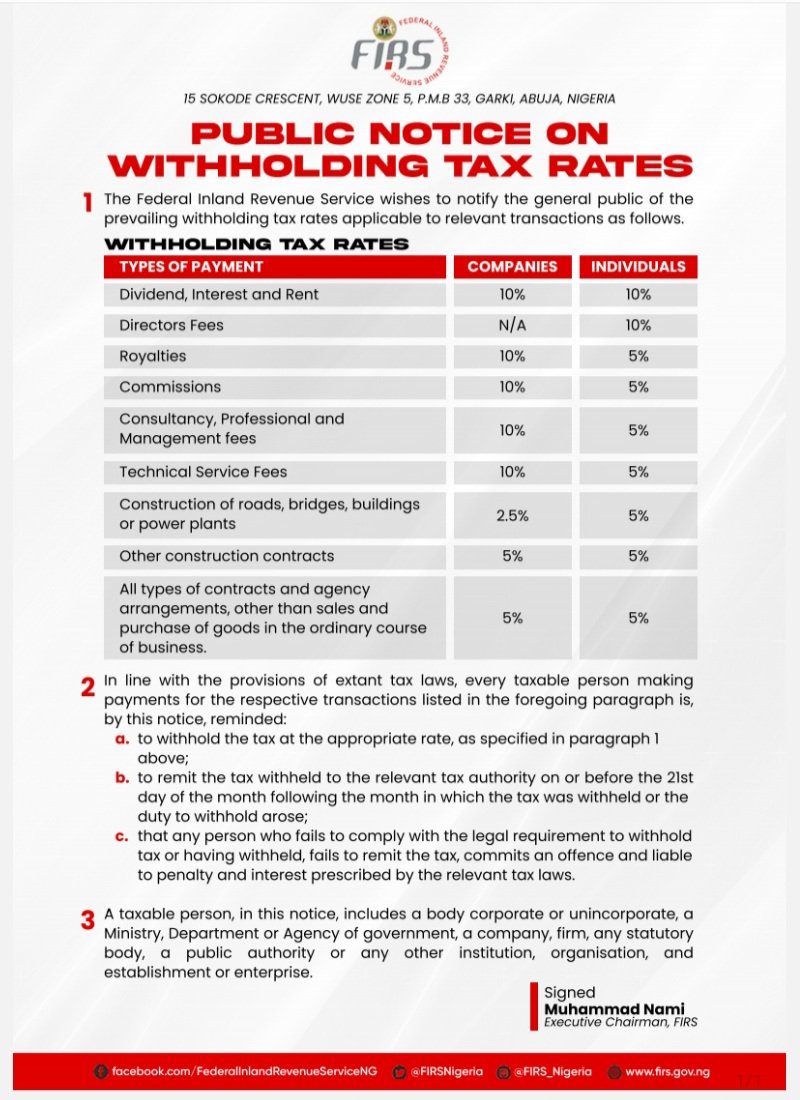 Experts have asked Nigerians to accept the fact that the country can no longer rely solely on revenue accruing from its natural resources to fund the budget, hence the need to embrace taxation as the new national fiscal policy.
Experts have asked Nigerians to accept the fact that the country can no longer rely solely on revenue accruing from its natural resources to fund the budget, hence the need to embrace taxation as the new national fiscal policy.
The experts on a webinar, organized by a firm, OTISVIP, made this submission today, July 25, with the Executive Chairman, Federal Inland Revenue Service (FIRS), Muhammad Nami, participating.
The theme of the webinar was “Stamp Duty: The New Black Gold?” It was hosted by Jake Effoduh, a Partner at Praxis & Gnosis Law.
Panelists on the online discussion were Dr. Alexander Ezenagu, an assistant professor of taxation at HBKU, Qatar; Managing Partner, Sprout Digital, Mrs. Damilola Anwo-Ade; Director, VoguePay, Malam Mohammed Jega; Managing Director, Trace Anglophone West Africa, Mr. Sam Onyemelukwe; Founder, The Alpha Reach, J.J.Omojuwa; and Director, Tax Policy, FIRS, Mathew Gbonjubola.
According to a statement by Director, Communications and Liaison Department, FIRS, Abdullahi Ismaila Ahmad, other management staff of the FIRS who participated in the webinar included Dr Asheikh Madugu.
Executive Chairman, FIRS, Muhammad Nami, set the ball rolling with a detailed clarification on the Stamp Duty Act in Nigeria, which included the types of transactions dutiable under the Act as well as the respective applicable rates.
While all panelists agreed on the need for taxation to compliment government’s revenue flow from natural resources, a debate ensued on the timing of the Stamp Duty campaign and the public debate surrounding the application of tax revenue in the nation-building processes, especially in building public infrastructure.
The panelists stressed the need for prudent management of tax revenue even as they enjoined Nigerians to embrace the fact that the tax net needs to get wider to accommodate more citizens for holistic national development.
Gbonjubola said that Nigerians must reassess the widespread notion that the country is rich, stressing: “in terms of Gross Domestic Product vis-à-vis our population, Nigeria is not a rich country when compared to a country like Botswana.”
He said that that the stamp duty is levied on the instrument of transaction and not on the payment itself.
Gbonjubola clarified that the 6% stamp duty is for tenancy above 21 years while 7 to 21 years lease or tenancy attracts 3% and less than 7-year tenancy is below 1%.
Dr. Ezenagu urged governments at all levels to focus on expanding economic activities through economic diversification, stressing that this would have the positive effect of increasing the tax base as there would be more economic activities to tax, instead of increasing taxation on the citizenry.
A citizen contributor with the username Yusuf.Nibox said: “Stamp duty is unlike other taxes: It needs rigorous drive through sectoral specialist tax monitoring. flat rates e-transactions are the low-hanging fruits but the computational ad valorem rated stamp duty on contracts, agreements etc need driving through monitoring or some sort of purity measure to compel compliance.”
Another citizen discussant with the username Cnjoku stated: “I have to disagree partly on the fact that non-stamping of documents doesn’t make it illegal. Transactions do not just occur in a vacuum. It has to be validated. For instance, if you make a land transaction, you must register it with the registry and get C of O to validate the ownership even when you have paid for it. Stamp duty on individuals is collected at state level where it is not fully enforced or even collected. I agree that the threshold on bank deposit is too low such that it affects the poor Nigerians.”








